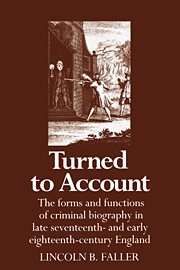 Turned to Account
Turned to Account Book contents
- Frontmatter
- Contents
- Preface
- Part I Turning criminals to account: three case histories and two myths of crime
- Part II Enucleating the truth: the criminal as sinner turned saint
- Part III Palliating his crimes: the thief as various rogues
- 6 Smiles, serious thoughts, and things beyond imagining: a provisional typology of thieves in action
- 7 Barbarous levities: fear, guilt, and the value of confusion
- 8 Everyone left to his own reflections: the oddity of the highwayman as hero and social critic
- Postscript: Criminal biography and the novel
- Appendix I Who read the popular literature of crime?
- Appendix II The politics of thieving
- Notes
- Select bibliography
- Index
8 - Everyone left to his own reflections: the oddity of the highwayman as hero and social critic
Published online by Cambridge University Press: 05 February 2012
- Frontmatter
- Contents
- Preface
- Part I Turning criminals to account: three case histories and two myths of crime
- Part II Enucleating the truth: the criminal as sinner turned saint
- Part III Palliating his crimes: the thief as various rogues
- 6 Smiles, serious thoughts, and things beyond imagining: a provisional typology of thieves in action
- 7 Barbarous levities: fear, guilt, and the value of confusion
- 8 Everyone left to his own reflections: the oddity of the highwayman as hero and social critic
- Postscript: Criminal biography and the novel
- Appendix I Who read the popular literature of crime?
- Appendix II The politics of thieving
- Notes
- Select bibliography
- Index
Summary
What to think concerning him, is left to every one's own Reflections.
Rev. Dr. Allen, Account of Machine (1750), p. 27Doubtless it must make some of our Readers merry, when they observe how often the Heros of these Sheets are introduced as talking of Conscience, Virtue, Honour, Generosity, & c.
Charles Johnson, Highwaymen (1734), p. 165Every Sessions-Paper shows you with what Contempt and Detestation those poor Dogs are treated for stealing three Silver Spoons, … a pair of Breeches and two Shirts, … [or] four Sheep, … not to mention the Heroes of this Class, the Horse-stealers, who are tuck'd up every Assizes without Mercy or Pity. But this can by no means be thought to extend to the numberless Arts and Branches of Industry and Policy, by which People of Rank and Distinction increase their Fortunes. … this would be an effectual way of cutting all the Nerves of Industry at one stroke, a fatal check to all the Mysteries of Trade and Commerce, and an absolute Discouragement to all sorts of Jobbers, Gamesters, Fortune-Hunters, and Jockeys, who are the Directors and Managers of all our Parties of Business and Diversion, and would be an insufferable Reflection upon … the glorious Titles of … able Ministers, cunning Statesmen, and consummate Politicians.
A Letter to a Member of Parliament, Containing a Proposal to Revise, Amend or Repeal the Ten Commandments (1738), pp. 17–18This is it which indeed makes her remarkable … and of so different a mixture[:] she was like no body, nor could not be Sorted by any Comparison. […]
- Type
- Chapter
- Information
- Turned to AccountThe Forms and Functions of Criminal Biography in Late Seventeenth- and Early Eighteenth-Century England, pp. 174 - 193Publisher: Cambridge University PressPrint publication year: 1987
